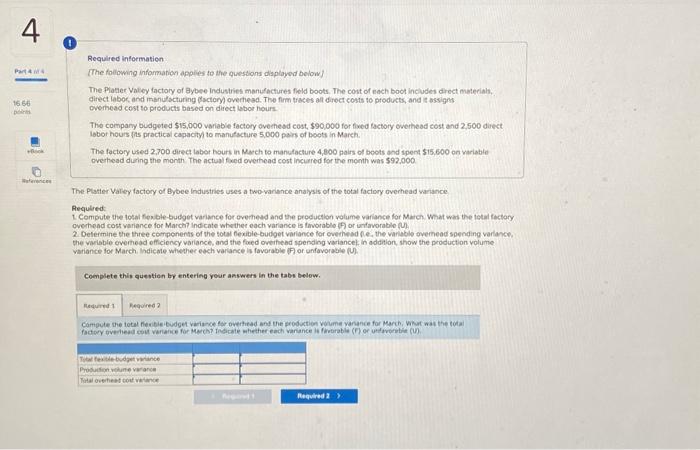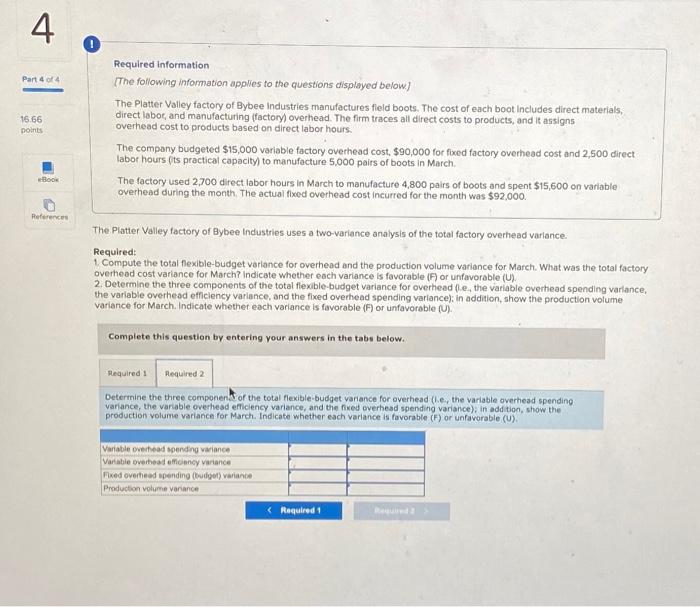Answered step by step
Verified Expert Solution
Question
1 Approved Answer
4 Part 44 16.66 points Rock c Required information i [The following information applies to the questions displayed below) The Platter Valley factory of


4 Part 44 16.66 points Rock c Required information i [The following information applies to the questions displayed below) The Platter Valley factory of Bybee Industries manufactures field boots. The cost of each boot includes direct materials, direct labor, and manufacturing (factory) overhead. The firm traces all direct costs to products, and it assigns overhead cost to products based on direct labor hours The company budgeted $15,000 variable factory overhead cost, $90,000 for fixed factory overhead cost and 2,500 direct labor hours (its practical capacity) to manufacture 5,000 pairs of boots in March. The factory used 2,700 direct labor hours in March to manufacture 4,800 pairs of boots and spent $15,600 on variable overhead during the month. The actual fixed overhead cost incurred for the month was $92,000 The Platter Valley factory of Bybee Industries uses a two-variance analysis of the total factory overhead variance Required: 1. Compute the total flexible-budget variance for overhead and the production volume variance for March. What was the total factory overhead cost variance for March? Indicate whether each variance is favorable (F) or unfavorable (U), 2. Determine the three components of the total flexible-budget variance for overhead (e, the variable overhead spending varlance, the variable overhead efficiency variance, and the foxed overhead spending variance), in addition, show the production volume variance for March. Indicate whether each variance is favorable (F) or unfavorable (U). Complete this question by entering your answers in the tabs below. Required 1 Required 2 Compute the total flexible budget variance for overhead and the production volume variance for March, what was the total factory overhead cost venance for March? Indicate whether each variance is favorable (F) or unfavorable (1) Total fexible-budget variance Production volume variance Total overhead cost valance Required 2> 4 Part 4 of 4 16.66 points References Required information. [The following information applies to the questions displayed below] The Platter Valley factory of Bybee Industries manufactures field boots. The cost of each boot Includes direct materials, direct labor, and manufacturing (factory) overhead. The firm traces all direct costs to products, and it assigns overhead cost to products based on direct labor hours. The company budgeted $15,000 variable factory overhead cost, $90,000 for fixed factory overhead cost and 2,500 direct labor hours (its practical capacity) to manufacture 5,000 pairs of boots in March. The factory used 2,700 direct labor hours in March to manufacture 4,800 pairs of boots and spent $15,600 on variable overhead during the month. The actual fixed overhead cost incurred for the month was $92,000. The Platter Valley factory of Bybee Industries uses a two-variance analysis of the total factory overhead variance. Required: 1. Compute the total flexible-budget variance for overhead and the production volume variance for March. What was the total factory overhead cost variance for March? Indicate whether each variance is favorable (F) or unfavorable (U). 2. Determine the three components of the total flexible-budget variance for overhead (.e., the variable overhead spending varlance, the variable overhead efficiency variance, and the fixed overhead spending variance); in addition, show the production volume variance for March. Indicate whether each variance is favorable (F) or unfavorable (U). Complete this question by entering your answers in the tabs below. Required 1 Required 2 Determine the three componen of the total flexible-budget variance for overhead (i.e., the variable overhead spending variance, the variable overhead efficiency variance, and the fixed overhead spending variance); in addition, show the production volume variance for March. Indicate whether each variance is favorable (F) or unfavorable (U). Variable overhead spending variance Variable overhead efficiency variance Fixed overhead spending (budget) variance Production volume variance
Step by Step Solution
There are 3 Steps involved in it
Step: 1

Get Instant Access to Expert-Tailored Solutions
See step-by-step solutions with expert insights and AI powered tools for academic success
Step: 2

Step: 3

Ace Your Homework with AI
Get the answers you need in no time with our AI-driven, step-by-step assistance
Get Started


